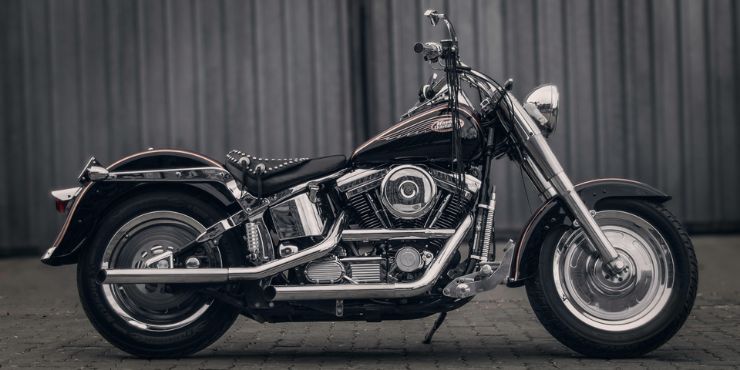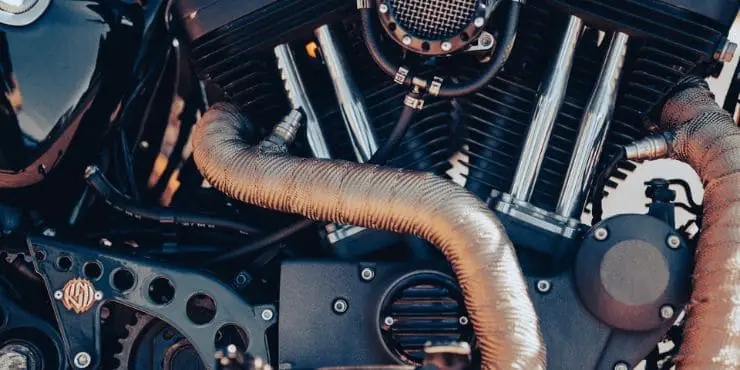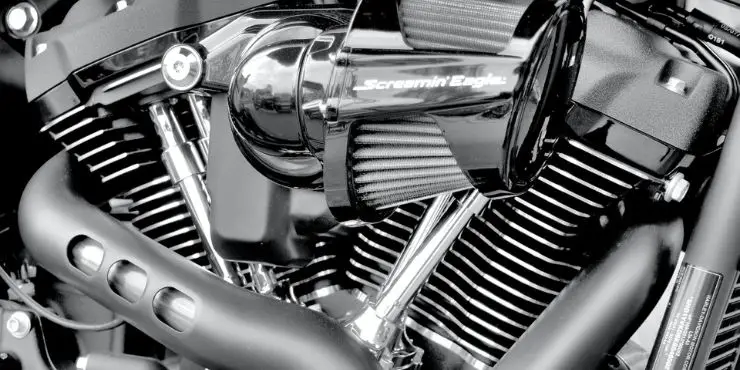Do you own a Harley-Davidson bike, and you’re wondering about the lifespan of your bike’s engine? If so, then you’re in the right place.
Harley-Davidson engines can last over 100,000 miles with proper maintenance, such as regular oil changes, part replacements, and timely servicing.
In this article, you’ll get to know all about Harley-Davidson engines, how long do Harley engines last, what is the longest lasting Harley-Davidson engine, what is the shortest lasting Harley-Davidson engine, the factors that affect how long a Harley-Davidson engine lasts, and more. Continue reading to know more about all the answers that you’re looking for.
How long do Harley engines last on average?
Some old Harley-Davidson engines were known to be very unreliable. However, this happened a long time ago. Unfortunately, that reputation still persists to an extent today. The Harley-Davidson engines today are quite reliable and can last for a long time. Some of the best Harley-Davidson engines that last long are –
- Harley-Davidson Evolution engine (EVO)
- Harley-Davidson Twin Cam engine (TC)
- Harley-Davidson Milwaukee-Eight engine
There are many bikers who claim to have driven their Harley EVO engines for over 100,000 miles. With proper care and maintenance, some even lasted for more than 145,000 miles. Many Harley-Davidson riders have stated that their TC engines last more than 90,000 miles with ease.
There are bikers who claim to have racked up over 200,000 miles on their bikes while barely having any issues. Meanwhile, there are some rare examples of Harley engines that have crossed 400,000 miles. This is more than enough to satisfy the rider’s satisfaction and keep the bike running for long.
After all, there’s a good reason why Harley-Davidson bikes claim the #2 position in an owner satisfaction survey carried out by Consumer Reports. However, reliability-wise, in another Consumer Reports survey, Harley-Davidson bikes fell in the middle. This can be quite different when it comes to modified Harley-Davidson bikes. Poorly done modifications can end up lowering the engine’s life expectancy significantly.
That’s why bikers agree that the biggest reason why engines fail is due to the user’s way of handling it. Even though there can always be lemons in the majority of the cases, a Harley engine mostly fails due to the owner’s fault.
Which is the longest-lasting Harley-Davidson engine?
Harley-Davidson is a reliable brand when it comes to the longevity of the engines. The most mileage that has been documented on a Harley-Davidson engine was 416,000 miles. This was accumulated on a 1987 Harley-Davidson Tour Glide. There were reports stating that the brand intended on studying the engine due to how long it lasted.
In 2009, a former Wisconsin senator Dave Zien incredibly put 1,000,000 miles on his 1991 Harley-Davidson FXRT. The bike is now put on display at the prestigious Sturgis Motorcycle Museum and Hall of Fame.
Which is the shortest a Harley-Davidson engine can last?
Harley-Davidson engines typically last a long time if they’re properly cared for and looked after carefully. In the worst-case scenarios, you might need to get your engine rebuilt at as little as 30,000 miles. In theory, an engine can fail at any point depending on reasons like poor maintenance, not following the recommended instructions for breaking in new bikes, reckless driving, not maintaining properly, and more. Factory defect is also a common factor that affects the lifespan of an engine.

There have been reports of some Harley-Davidson engines having oil leaks after running as little as 6,000 miles. Meanwhile, engines could also remain failure-free for over 100,000 miles. To ensure a long lifespan of the engine, the bearings, valves, and pistons should stay in great condition.
How long can a Harley-Davidson engine last before having to be rebuilt?
When discussing how long do Harley engines last, you shouldn’t overlook the fact that the engines will need to be rebuilt at some point. Rebuilding the Harley engine shouldn’t really be considered an engine failure. Instead, it is more of a part of the routine maintenance of the bike.
A Harley-Davidson engine can last anywhere between 30,000 to 150,000 miles before it needs to be rebuilt. When they should be rebuilt will depend on a number of factors. The top-end usually has to be rebuilt at 60,000 to 80,000 miles. Meanwhile, the bottom end of the engine may have to rebuilt at around 80,000 to 120,000 miles.
How many years do Harley-Davidson engines usually last?
In terms of years, Harley-Davidson engines can easily last a really long time if you take proper care of them. If the engine is properly looked after, kept clean, maintenance and care have been performed routinely and has been stored in the right way, it can easily last up to 50 years.
On the other hand, poor maintenance, cleaning, care, and storing the bike outside can reduce the lifespan of the engine. In fact, it could end up failing in less than 10 years or so.
Factors that affect how long your Harley-Davidson engine will last
If you’ve purchased a Harley-Davidson bike, you’ll expect your costly investment to last for a long time. It’s important to understand that there are many factors that affect how long your Harley engine will last. If you keep these factors in mind and maintain your bike well while avoiding any accidents, your bike’s engine can last for a long time.
Engine maintenance and care
Care and maintenance is a significant factor in your bike’s lifespan and is the best friend to any engine. Harley-Davidson has a reputation as unreliable bikes back in during the AMF years between 1968 and 1981. However, the brand’s reputation as unreliable bikes grew back due to poor maintenance, modifications, and repairs done by their owners. In most cases, Harley-Davidson bikes that are properly maintained and cared for are very reliable. In comparison, bikes that haven’t been maintained properly can run into reliability issues.
The quality of the oil, the filters, and the frequency of oil change also affect how long the engine lasts. As a Harley-Davidson bike’s engine tends to overheat, the oil must be changed more frequently compared to other bikes. Using cheap replacement parts can cause a Harley-Davidson bike to break down sooner than you expected. Engine rebuilding should be considered a key part of the maintenance process. It is necessary if you’re looking to keep your engine in good condition.

There are many maintenance tasks that need to be completed regularly. The oil must be changed. The transmission fluid needs to be flushed. The tires should be changed. The brakes should also be checked. If any of the maintenance tasks are neglected, then your bike will have plenty of issues.
With routine maintenance, one of the main goals is to identify small issues with the bike. Once they are identified, you have to rectify them before they end up becoming a big issue. In case there are small issues with your bike, and they’re allowed to grow, they can start impacting the engine. Your engine could start having issues much sooner than expected.
The biker’s riding style
Naturally, the riding style of the biker is the second thing that must be taken into consideration. Having an aggressive riding style is generally detrimental to the lifespan of your bike’s engine. Things like wheelies, burnouts, or drag racing can easily lower the life expectancy of your bike’s engine.
Driving the bike in normal RPM ranges, not abusing the bike, and allowing the engine to properly warm up are a few ways of ensuring the engine stays in prime condition. One of the easiest ways of negatively affecting a Harley-Davidson bike’s engine is to let it overheat.
It happens in multiple ways. For instance, revving the engine when at stoplights or riding at walking speeds or just being caught in traffic jams for long periods on hot summer days can lead to the engine overheating. It is possible for the engine to not even start if switched off until you’ve allowed it to cool down.
Modifications and customizations to the engine
Even though stock Harley-Davidson bikes are fast enough, some owners might not be happy with how their bike is performing. It could possibly be a result of Harley-Davidson’s older engine design. Even though the air-cooled, 45-degree, pushrod engines have a distinct look, they’re limited in terms of performance and power output. As a result, bikers carry out different types of engine modifications. This ultimately affects the bike and engine’s performance in the long run.
Conclusion
Thank you for reading. Hopefully, now you know a lot more about Harley-Davidson engines, how long do Harley engines last, what is the longest lasting Harley-Davidson engine, what is the shortest lasting Harley-Davidson engine, factors that affect how long a Harley-Davidson engine lasts, and more. A Harley-Davidson bike’s engine usually lasts for over 150,000 miles if you’re running around 10,000 miles per year. However, if you’re only putting 5,000 miles per year, then your bike could end up dying well before reaching 150,000 miles as the bike is starting to push 20 years old.

